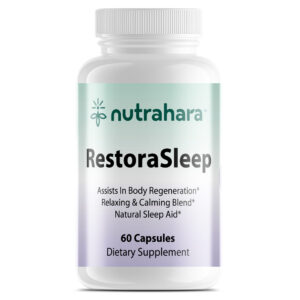
Nutrahara Blog
Nutrahara Blog
7 Best Herbs for Sleep
1. Introduction to Herbs for Sleep
In today’s fast-paced world, millions struggle to get the restorative rest their bodies need. Sleep disorders and nighttime anxiety are especially common among women dealing with hormonal fluctuations, stress, caregiving responsibilities, and lifestyle pressures. Unfortunately, many turn to pharmaceutical sleep aids, which can cause dependency, grogginess, or a dull feeling upon waking. This is where natural alternatives—particularly herbs for sleep—come into play.
Herbs for sleep have been used for centuries in traditional medicine systems like Ayurveda, Traditional Chinese Medicine, and Western herbalism. These botanical remedies work gently with the body to calm the nervous system, reduce stress hormones, and prepare the mind for sleep. What makes them especially appealing is their ability to promote deep, natural sleep without the harsh side effects of synthetic drugs.
From sipping a cup of chamomile tea before bed to taking valerian root capsules or diffusing lavender oil, using herbs for sleep can be a simple yet effective lifestyle change. Whether you’re experiencing difficulty falling asleep, staying asleep, or waking up feeling unrefreshed, this article will guide you through evidence-backed herbal solutions tailored to your sleep concerns—so you can finally wake up feeling rested and renewed.
2. Why Natural Sleep Remedies Matter
Sleep is one of the most critical pillars of health, yet it’s often sacrificed in the hustle of daily life. For women, in particular, sleep challenges can arise from hormonal shifts (during menstruation, pregnancy, or menopause), emotional stress, or even caregiving roles that disrupt nighttime routines. Over time, lack of quality sleep can lead to a weakened immune system, cognitive decline, mood disorders, and increased risk of chronic diseases like hypertension and diabetes.
While over-the-counter or prescription sleep medications may offer a quick fix, they often come with downsides—dependency, tolerance, or next-day grogginess. That’s why more and more people are turning to herbs for sleep as a natural alternative. These plant-based remedies gently support the body’s circadian rhythm and soothe the mind without the harsh side effects of pharmaceuticals.
Herbs like valerian, chamomile, ashwagandha, and lavender are not only effective in promoting relaxation and sleep but are also rich in antioxidants and adaptogens that benefit overall wellness. Choosing herbs for sleep is more than just an alternative remedy—it’s a way to align with nature, honor your body’s natural rhythms, and create sustainable bedtime rituals that nourish your health long-term.
3. How Herbs for Sleep Work
Understanding how herbs for sleep function can empower you to choose the right remedy tailored to your needs. Unlike synthetic sleep medications that often act as blunt-force sedatives, herbs work in harmony with your body’s natural systems—especially the nervous system and endocrine system.
3.1 Calming the Nervous System
Many herbs for sleep, such as valerian root, passionflower, and lemon balm, work by influencing neurotransmitters like GABA (gamma-aminobutyric acid), a chemical messenger that promotes relaxation and reduces brain activity. When GABA levels are elevated, the mind calms down, anxiety eases, and the body enters a state conducive to sleep. These herbs often mimic or enhance GABA activity naturally, making them gentle but effective.
3.2 Regulating Circadian Rhythms
Other herbs for sleep—like chamomile and ashwagandha—help balance cortisol (the stress hormone), which plays a crucial role in your sleep-wake cycle. Elevated nighttime cortisol levels are a common reason people struggle to fall asleep. By lowering stress and supporting melatonin production, these herbs help recalibrate the circadian rhythm.
Together, the effects of these herbs promote not just the quantity of sleep but also its quality—helping you move through all the essential stages of sleep, including REM and deep sleep, with greater ease and consistency.
4. 7 Popular Herbs for Sleep and Their Benefits
When it comes to natural remedies for better rest, certain herbs have stood the test of time. These herbs for sleep not only help you fall asleep faster but also improve the overall quality of your rest—leaving you refreshed, not groggy. Here’s a closer look at seven of the most trusted and effective herbs used for promoting sleep.
4.1 Chamomile
Chamomile is one of the most widely consumed herbs for sleep, often enjoyed as a soothing tea. It contains a powerful antioxidant called apigenin, which binds to GABA receptors in the brain, reducing anxiety and inducing drowsiness. Chamomile is gentle enough for daily use and is particularly helpful for women who experience premenstrual or menopausal insomnia.
4.2 Valerian Root
Often referred to as “nature’s Valium,” valerian root is a potent herbal sedative. It works by boosting GABA levels and relaxing both the mind and muscles. Studies show that valerian root can reduce the time it takes to fall asleep and improve sleep quality, especially when used consistently over a few weeks.
4.3 Lavender
Lavender is a versatile herb for sleep that can be used as a tea or essential oil. Its calming aroma has been shown to lower heart rate, reduce stress, and promote deeper sleep. Diffusing lavender oil in the bedroom or adding a few drops to your pillow can help induce a restful environment.
4.4 Passionflower
Passionflower is a lesser-known but highly effective herb that enhances GABA activity in the brain. It’s ideal for individuals who experience restless sleep due to an overactive mind or anxiety. Passionflower is commonly used in tea or tincture form.
4.5 Ashwagandha
An adaptogenic herb from Ayurvedic medicine, ashwagandha helps regulate cortisol and manage stress. Its balancing effect on hormones makes it particularly useful for women dealing with insomnia related to anxiety or hormonal changes.
4.6 Lemon Balm
Lemon balm, a member of the mint family, is known for its mood-lifting and anti-anxiety properties. It calms the nervous system and promotes relaxation, making it a great herbal tea for bedtime.
4.7 Hops
Best known as a flavoring in beer, hops also have strong sedative properties. Often combined with valerian root, hops are effective for reducing restlessness and encouraging deep, uninterrupted sleep.
5. 7 Practical Tips for Using Herbs for Sleep
While the right herbs for sleep can work wonders, how and when you use them matters just as much. To truly benefit from their natural sedative effects, it’s important to create a consistent routine and combine these herbs with sleep-supportive habits. Here are seven expert-approved tips to help you maximize the power of herbs for sleep:
5.1 Choose the Right Format
Herbs come in a variety of forms—each with its own advantages:
- Teas are ideal for relaxing bedtime rituals and work well for herbs like chamomile and lemon balm.
- Capsules or tablets offer measured doses, perfect for valerian root or ashwagandha.
- Tinctures provide fast absorption and can be taken sublingually for quicker results.
- Aromatherapy with lavender oil can calm the senses and set the mood for rest.
5.2 Create a Herbal Bedtime Routine
A calming routine signals your brain it’s time to sleep. Brew a cup of your chosen herbal tea, dim the lights, stretch gently, or practice deep breathing. Consistency is key.
5.3 Combine Herbs for Synergy
Certain herbs for sleep work even better together. Examples:
- Valerian + Hops: A potent sleep-inducing combination
- Chamomile + Lemon Balm: Enhances relaxation and reduces anxiety
5.4 Use Herbs Regularly for Best Results
Herbs are not instant fixes—they work gradually. Most herbal remedies reach full effectiveness after 1–2 weeks of daily use. Be patient and stay consistent.
5.5 Avoid Evening Stimulants
Avoid caffeine, chocolate, or alcohol at least 4–6 hours before bedtime, as they interfere with your sleep cycle and reduce the effectiveness of herbs for sleep.
5.6 Track Your Progress
Maintain a sleep journal to note how each herb affects your sleep, mood, and energy levels. This will help you fine-tune your herbal regimen.
5.7 Combine with Other Sleep Hygiene Habits
To boost the effect of herbs for sleep, reduce screen time, maintain a consistent sleep schedule, and create a dark, quiet sleeping environment.
6. Scientific Research Supporting Herbs for Sleep
While traditional use of herbs for sleep dates back centuries, modern science has begun to validate their effectiveness through clinical research and peer-reviewed studies. These findings help bridge the gap between ancient herbal wisdom and modern wellness practices, giving users confidence in their natural sleep strategies.
6.1 Chamomile and Clinical Evidence
Chamomile has been extensively studied for its calming properties. A notable randomized controlled trial published in the Journal of Advanced Nursing (2016) observed improved sleep quality in elderly participants who consumed chamomile extract twice daily for four weeks. Another study in postpartum women showed chamomile tea significantly reduced sleep disturbances and improved overall well-being within just two weeks.
6.2 Valerian Root Meta-Analyses
Valerian root is among the most researched herbs for sleep. A comprehensive meta-analysis in The American Journal of Medicine (2006) found valerian effective in improving sleep latency and sleep quality. Though individual response varies, studies suggest that continuous use over several weeks yields the most noticeable benefits.
6.3 Ashwagandha’s Effect on Stress and Sleep
A 2020 clinical trial published in Cureus examined the impact of ashwagandha root extract on adults with insomnia and anxiety. Participants who took 300 mg of ashwagandha twice daily reported a significant increase in total sleep time and sleep efficiency, along with reduced stress levels.
6.4 Lavender and Aromatherapy Research
Lavender oil has been studied in both hospital and home environments. Research in Frontiers in Behavioral Neuroscience (2017) showed that inhalation of lavender aroma improved sleep onset and increased deep sleep stages in test subjects.
These findings reinforce what herbalists have long known: when used appropriately and consistently, herbs for sleep can be a safe and effective solution for improving rest and relaxation.
7. Real-Life Testimonials from Women Using Herbs for Sleep
Hearing how other women have benefited from herbs for sleep can provide both inspiration and confidence to begin your own natural sleep journey. From busy moms to career professionals and women navigating hormonal shifts, these real-life stories reflect the transformative power of herbs when integrated into daily routines.
Jessica, 41 – California
“I used to lie awake for hours scrolling on my phone, unable to shut my mind off. A friend recommended chamomile tea, and I started pairing it with a few drops of lavender oil on my pillow. Within a week, my sleep improved dramatically. Now, it’s my sacred ritual before bed—it signals my body to slow down and prepare for rest.”
Priya, 36 – New Jersey
“Work stress was affecting my sleep and mood. I tried ashwagandha after reading about its stress-relieving benefits. After two weeks, I noticed I wasn’t waking up in the middle of the night anymore. I feel more balanced and emotionally calm—even during chaotic days.”
Elena, 52 – Florida
“Menopause hit me with intense night sweats and insomnia. I was hesitant to try sleeping pills, so I looked into natural alternatives. Valerian root capsules, taken an hour before bed, made a huge difference. I fall asleep faster and stay asleep longer, without any grogginess in the morning.”
Marissa, 47 – Oregon
“After my third child, sleep was nearly impossible. I found a tea blend with passionflower and lemon balm, and it changed everything. I feel relaxed by the time I finish the cup. I’ve finally reclaimed a sense of calm at night.”
Alicia, 39 – Texas
“My therapist introduced me to a calming nighttime routine that includes journaling and using herbs for sleep. Hops and valerian tincture, paired with a few minutes of deep breathing, make me feel grounded and sleepy. No more restless tossing and turning!”
8. Conclusion: Embrace the Power of Herbs for Sleep
Restful sleep is not a luxury—it’s a necessity for physical health, mental clarity, and emotional balance. Yet, for millions of women, falling asleep and staying asleep can be a nightly battle influenced by stress, hormonal shifts, and overstimulation. Fortunately, the natural world offers time-tested solutions. Herbs for sleep provide a safe, gentle, and effective way to restore your body’s natural rhythms and reclaim peaceful nights.
Unlike synthetic sleeping pills that may mask symptoms or cause dependency, herbs like chamomile, valerian root, lavender, passionflower, and ashwagandha work with your body. They regulate stress hormones, calm the nervous system, and create a holistic state of relaxation. The beauty of using herbs for sleep lies in their ability to do more than just knock you out—they nourish your overall well-being and contribute to long-term emotional and hormonal harmony.
Whether you start with a simple evening tea or try a combination of capsules and aromatherapy, the key is consistency and mindfulness. Build your nighttime routine around calm, comfort, and nature’s healing power.
So, if sleepless nights have been your norm, let tonight be different. Let the soothing embrace of nature’s herbs guide you into a deep, restorative slumber. With time, patience, and the right herbal support, better sleep is not just possible—it’s your new reality.
Written by the Nutrahara Team
This article was developed by the Nutrahara team of nutrition scientists and naturopaths, who specialize in formulating safe, effective, and science-backed supplements for women’s health. Every ingredient we use is carefully selected to support your body’s unique needs—naturally. Follow us on LinkedIn for expert insights and updates on our latest wellness solutions.










